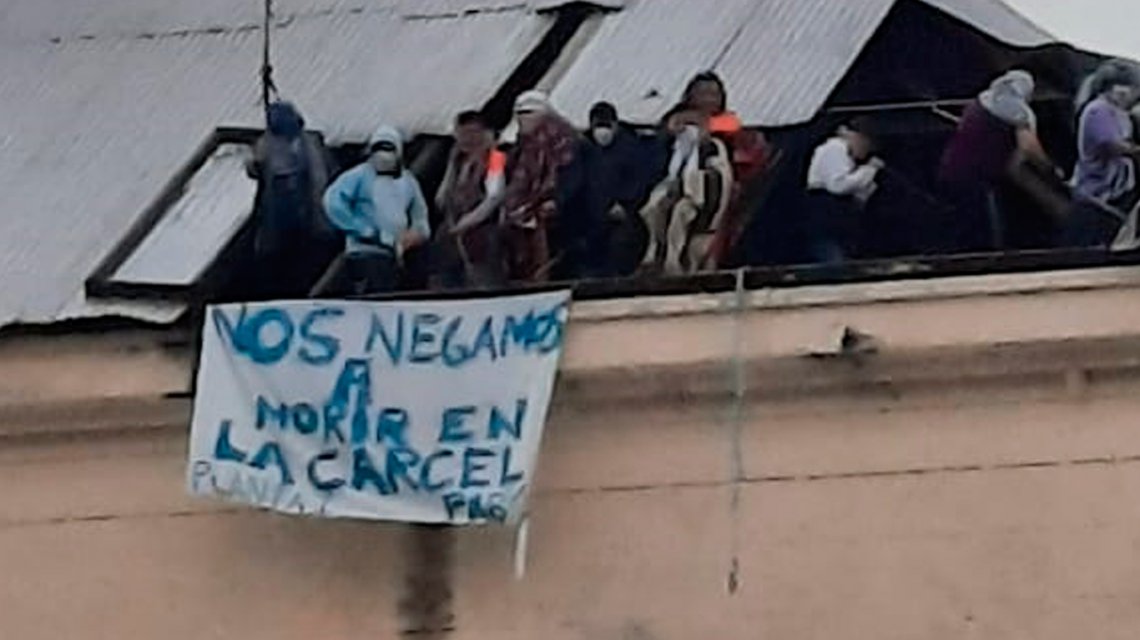
Around the World of Covid, the news these days is pretty grim, and the news from prisons, jails, immigrant detention centers, juvenile detention centers is worse. In those places of confinement, generally, rates of infection are rising precipitously and, despite much hand wringing and loud sighing, the State and nation-states have done little to nothing to less than nothing. Given the past decades increased investment in mass and hyper incarceration, this comes as no surprise. But there is good, or at least hopeful, news, and that is in prisoners’ individual and collective actions and resistance. April saw prison uprisings, demonstrations, hunger strikes, and other actions in Sierra Leone, Argentina, Colombia, the United States and beyond. Everywhere, prisoners echo the banner resisting prisoners hung from the rooftop of the Devoto prison in Buenos Aires: “Nos negamos a morir en la cárcel.” We refuse to die in prison. In Virginia, Cynthia Scott, 50 years old, African American, currently incarcerated at the Fluvanna Correctional Center for Women, agreed: “I was not sentenced to death, and I don’t want to die here. But I am afraid I will when the coronavirus comes.” In Canada, on April 21, Joelle Beaulieu, a member of the Ojibwe Nation, incarcerated in a Canadian federal prison in Joliette, Quebec, said NO! to the death sentence of conditions in the federal prisons and sued the Correctional Service Canada for its response, or lack of response, to the Covid pandemic. I was not sentenced to death. We refuse to die in prison.
At the end of April, Joelle Beaulieu sued on behalf of all federal inmates who had been imprisoned in federal prisons in Quebec since March 13. What happens to one happens to all. What happened to Joelle Beaulieu is she was incarcerated at Joliette Women’s Institution. She worked as a cleaner. Joelle Beaulieu worked in highly trafficked, congested areas. When she heard about the pandemic, she asked for gloves, mask and protective gear. The authorities only gave her gloves. When Joelle Beaulieu began developing symptoms, she was given Tylenol. For a week, her symptoms intensified. Finally, after a week, Joelle Beaulieu was tested. Then Joelle Beaulieu was sent to her cell, into what amounted to solitary confinement, for 15 days. She requested either a Native elder or a mental health professional. No one was provided. She says guards did not wear masks or gloves until after she tested positive. Prisoners were told to wash their hands, but were not given disinfectant.
Joelle Beaulieu believes she is “patient zero” of the Joliette Women’s Institution. Within two weeks, the number of Covid positive cases rose from 10 to 50, and by the time Joelle Beaulieu filed her case, more than half the residents had tested positive. On April 21, Quebec reported 114 positive cases. Of that 114, 51 were Joliette Women’s Institution prisoners. Of the women in Quebec who tested positive for Coronavirus, almost all were `residents’ of Joliette Women’s Institution. Joliette Women’s Institution is no outlier, and Joelle Beaulieu’s situation is in no way exceptional. According to Emilie Coyle, Executive Director of the Canadian Association of Elizabeth Fry Societies, “Every time we speak with women who are inside the prisons, whether it’s in Joliette or other federal institutions – they let us know they feel as though they’re not getting the right information. They’re kept in the dark. And that’s particularly concerning for them because they’re trying very hard to participate in keeping themselves safe and healthy.”
In Buenos Aires, when prisoners resisted, they released a statement which said, in part, “We are a mirror of the very society that forgets us and drowns in its own misery, silencing its own true reality:
Those who give up will never win.
We refuse to die in prison.
For a world without slavery and without exclusion.”
From the rooftops of a jail in Buenos Aires to the women’s prison of Virginia to the women’s prisons of Quebec, people are resisting the dehumanization of slavery and exclusion, engaging in the Great Refusal which is the Great Affirmation. They will not be kept in the dark nor will they be silenced. In Canada, Joelle Beaulieu, member of the Ojibwe Nation, said NO to the inhumanity, insisted she was not sentenced to die in prison, and lit a match to light the way to a world without slavery and without exclusion. Others will follow. The struggle continues.
(Photo credit: Sol915)